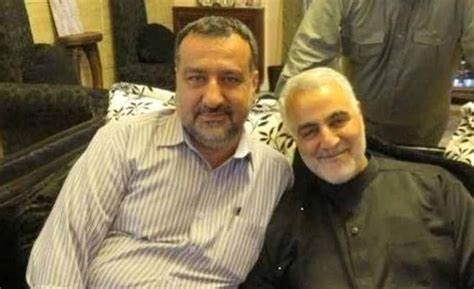Escalating 'shadow war' between Israel and Iran on the Lebanese border
The elimination of IRGC General Razi Mousavi in Syria is a new step in an increasingly regional conflict. The departure of Russian troops from Syria has left a vacuum that gives Iran “room for manoeuvre”. Lebanese civilians are fleeing the south, especially Christian villages. For many, Christmas Mass was but the calm before the storm.
Beirut (AsiaNews) – In the "shadow war" between Israel and Iran, a severe blow was dealt to Tehran on Monday, with the elimination of Brigadier General Razi Mousavi, described by the Islamic Revolutionary Guards Corps (IRGC) as "one of the most experienced advisers" to the force.
Mousavi, who played a crucial role in Iran's political and military expansion in the Middle East, and controlled the transfer of Iranian weapons from Syria, was killed in a three-missile strike that targeted his residence in the Sitt Zeinab neighbourhood in Damascus. He was on his way back from the Iranian embassy, according to Al-Jazeera TV.
Iran blamed the attack on Israel, which never claims responsibility for such operations. Yet, the Israeli strike is clearly part of a strategy to disrupt Iranian arms deliveries in the region, as the war rages on in Gaza and low- and medium-intensity fronts have opened in Lebanon, Iraq, and Yemen on the Red Sea.
Since the start of the war in Gaza, the airports of Damascus and Aleppo have been repeatedly hit by strikes attributed to Israel, putting them out of service for weeks.
Mousavi's elimination is part of the "octopus" strategy devised by former Israeli Prime Minister Naftali Bennett. A strategy that no longer aims to attack only Iran's tentacles, i.e. Iran's network of proxy armed groups in the Middle East, but to directly target the “octopus", the Islamic Republic itself.
What Israel increasingly fears is that the partial vacuum left by Russia in Syria – by redeploying part of its forces to Ukraine – will leave more room for Iran and its proxies, said David Khalfa, an expert at the Jean Jaurès Foundation.
Will Tehran react to this blow in proportion to its severity? That is the million-dollar question.
Israeli officials say that their military is preparing for retaliation from Syria and Lebanon. Iran has vowed to avenge Razi Mousavi’s death. President Ebrahim Raisi warned that Israel " will certainly pay" for the assassination and Hezbollah said the Israeli strike “crosses all boundaries.”
Israel itself has indirectly acknowledged its responsibility through its foreign minister, Eli Cohen, who warned Hassan Nasrallah about his elimination if he persisted in refusing any diplomatic solution to the ongoing conflict on the Lebanese-Israeli border.
"Iran's response will be tactical. This could be in the cyber domain or on the high seas. But at the end of the day, the attack or any response will be calibrated, because it is still aimed at avoiding a regional conflagration," argues expert Sanam Vakil of Chatham House.
For its part, Israel is still being pressured by the United States to stick to the rules of engagement to prevent a wider conflict.
Mousavi’s elimination indirectly (by mistake?) raised the issue of Iran's participation in Operation Al-Aqsa Flood.
A statement on Wednesday by IRGC spokesman Ramezan Sharif sowed confusion by claiming that the 7 October uprising in Gaza was “one of the acts of revenge for the assassination of General Soleimani" on 3 January 2020 in Iraq.
Hamas immediately reacted to the statement, denying any link between the US drone attack and the Gaza uprising. The IRGC spokesman himself partially backtracked the same day by saying that they had been "taken out of context". But no one is fooled. This denial only means that Tehran does not want a general conflagration, as its participation in the conflict is no secret.
Besides, why did Lebanon's Hezbollah react to the elimination of Mousavi in Syria, stating that a "red line" had been crossed?
Moving from words to deeds, in a southern Lebanon deserted by 90 per cent of its population, according to Aid to the Church in Need (ACN), Hezbollah on Wednesday launched the largest number of rockets and armed drones in a single day, since 8 October.
In this part of Lebanon, escalation has been the key word since Wednesday, after a short respite for Christmas, at least in Christian villages such as Rmeich, where Nuncio Paolo Borgia attended Christmas Mass, in a church full of worshippers.
It was the calm before the storm.
17/05/2021 10:29







.png)










